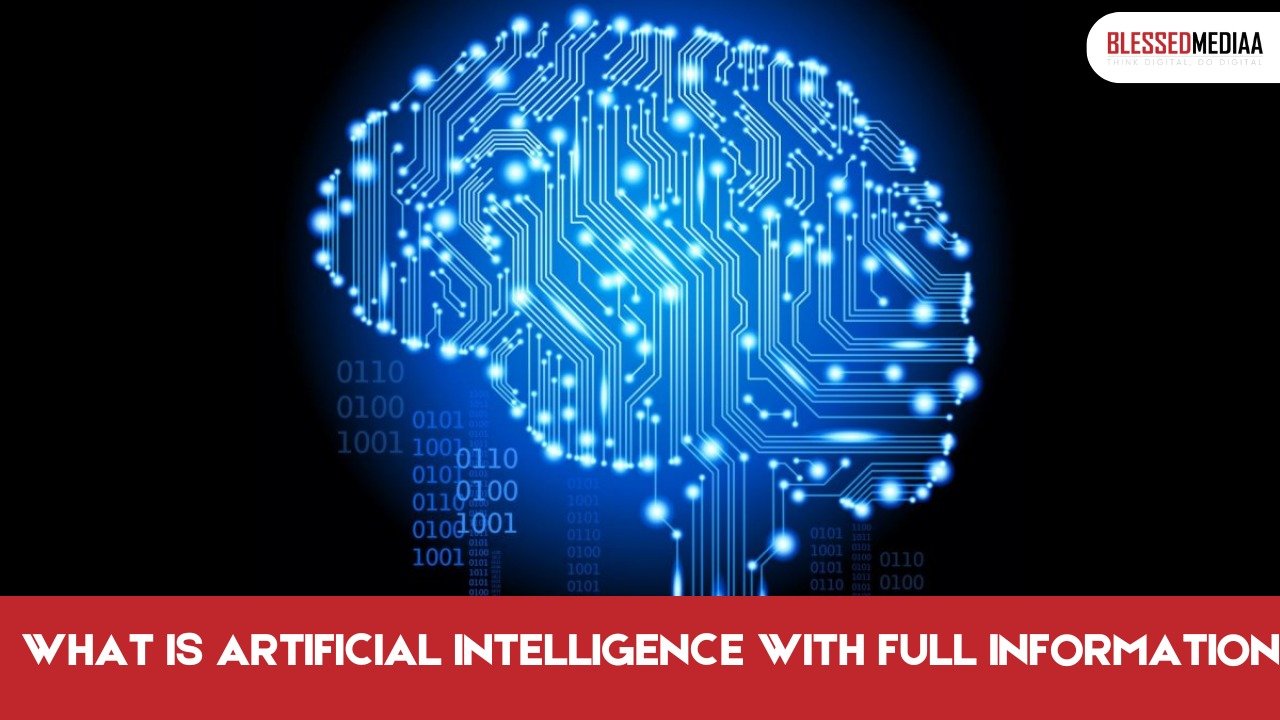What is Artificial Intelligence ?
At Blessed Media, we bring you insightful and simplified content to help you understand today’s fast-changing technologies. Today, let’s explore the exciting world of Artificial Intelligence (AI) and the rising trend of Generative AI—a game-changer in the field of technology.
Introduction to Artificial Intelligence
Artificial Intelligence is everywhere—from Google Maps, Alexa, Siri, and Google Assistant to self-driving cars. AI enables machines to mimic human intelligence, allowing them to think, learn, and make decisions like humans.

The Concept of Artificial Intelligence
What is AI?
Artificial Intelligence (AI), or Kratrim Buddhimata in Hindi, consists of two parts:
- Kratrim – Man-made or artificial
- Buddhimata – Intelligence or the ability to think
It is a branch of computer science that creates intelligent systems capable of thinking, learning, and acting like humans.
How Does Artificial Intelligence Work?
AI works through a combination of:
- Logic-based programming
- Machine Learning (ML)
- Deep Learning (DL)
AI-powered systems analyze huge datasets, recognize patterns, and make predictions. They can:
- Recognize speech and images
- Perform data analysis
- Make smart decisions in real-time
Generative AI: A New Era of Intelligence
What is Generative AI?
Generative Artificial Intelligence (Generative AI) is a type of AI that creates new content—like text, images, videos, music, and even code. It uses neural networks trained on massive datasets to generate creative outputs.
Generative AI vs Traditional AI
| Feature | Traditional AI | Generative AI |
|---|---|---|
| Function | Analyzes & automates | Creates new content |
| Example | Google Maps, Alexa | ChatGPT, DALL·E, Gemini |
| Learning Model | Supervised/unsupervised | Neural networks + deep learning |
| Output | Predictions, actions | Original images, videos, texts etc. |
How Does Generative AI Work?
Generative AI uses models like:
- GANs (Generative Adversarial Networks)
- Transformers (e.g., ChatGPT, Gemini, Claude)
These models are trained to understand patterns and generate new data based on prompts or input. That’s why Generative AI prompts list are popular for getting creative, on-demand results.
Popular Generative AI Examples (2025)
- ChatGPT – Text generation, conversation
- DALL·E – AI image generation
- Sora by OpenAI – AI video creation
- RunwayML – Video editing & effects
- Midjourney – Artistic image generation
- Writesonic – AI content writing
- Descript – AI video/audio editing
These Generative AI tools (2025) are transforming how we work, create, and communicate.
Types of Artificial Intelligence
1. Weak AI (Narrow AI)
- Built for specific tasks
- Examples: Alexa, Siri, Google Assistant, Chatbots
2. Strong AI (General AI)
- Human-like thinking and reasoning
- Still in development
3. Super AI
- Beyond human intelligence
- A futuristic concept
History of Artificial Intelligence
- 1956: Term “AI” coined by John McCarthy, the Father of AI
- 1980s-90s: Rise of machine learning
- 2000s-present: AI in robotics, self-driving cars, and healthcare
Applications of Artificial Intelligence
- Virtual Assistants – Siri, Alexa, Google Assistant
- Navigation – Google Maps uses AI for traffic predictions
- E-Commerce – Amazon uses AI for recommendations and Echo voice queries
- Self-Driving Cars – Tesla uses AI-powered vision and sensors
- Manufacturing – AI robots for repetitive, precision tasks
- Gaming – Chess, Ludo, and video games with AI opponents
- Healthcare – AI in diagnosis, robotic surgeries
- Finance – Fraud detection, market prediction, customer support
Benefits of Artificial Intelligence
- Reduces Human Error
- Faster Decision-Making
- 24/7 Availability
- Efficiency in Industries
Generative AI Benefits and Risks
Benefits
- Creativity Boost – Writers, designers, marketers benefit
- Speed & Scale – Instant content generation
- Personalization – Tailored user experiences
- Enhanced Productivity – Automates tasks
Risks
- Misinformation – Fake content or deepfakes
- Job Displacement – In creative and tech industries
- Bias and Ethics – Generative models can reflect data bias
- Security Issues – Can be misused to create harmful content
Generative Engine Optimization (GEO): The Future of SEO
GEO is the next evolution of SEO (Search Engine Optimization). Instead of just optimizing for search engines, GEO means optimizing your content for AI-generated responses and voice-based assistants like ChatGPT or Google’s Gemini. This includes using structured content, semantic keywords, and AI-relevant queries.
Future of Artificial Intelligence
The future of AI—and especially Generative AI—is vast and full of potential. From creative industries to healthcare and education, AI is reshaping how we live. However, ethical usage, regulation, and awareness are key to a safe and productive AI-powered future.
AI Search Trends: What Are People Asking in 2025?
- “How does generative AI work?”
- “Best generative AI tools 2025”
- “Generative AI examples in daily life”
- “Is AI replacing jobs?”
- “What is Generative Engine Optimization (GEO)?”
These trends show a growing curiosity around generative artificial intelligence and its impact.
Final Thoughts: Is AI Good or Bad?
What do you think?
Is AI helping humanity progress, or is it becoming too powerful? Share your thoughts in the comments below!
Conclusion
Artificial Intelligence, especially Generative AI, is revolutionizing the world around us. While it offers great promise, it’s important to use it wisely. Stay informed, stay creative, and keep exploring!
If you found this article helpful, like, share, and comment.
👉 For more insightful content, follow us and visit our website: www.blessedmediaa.com
